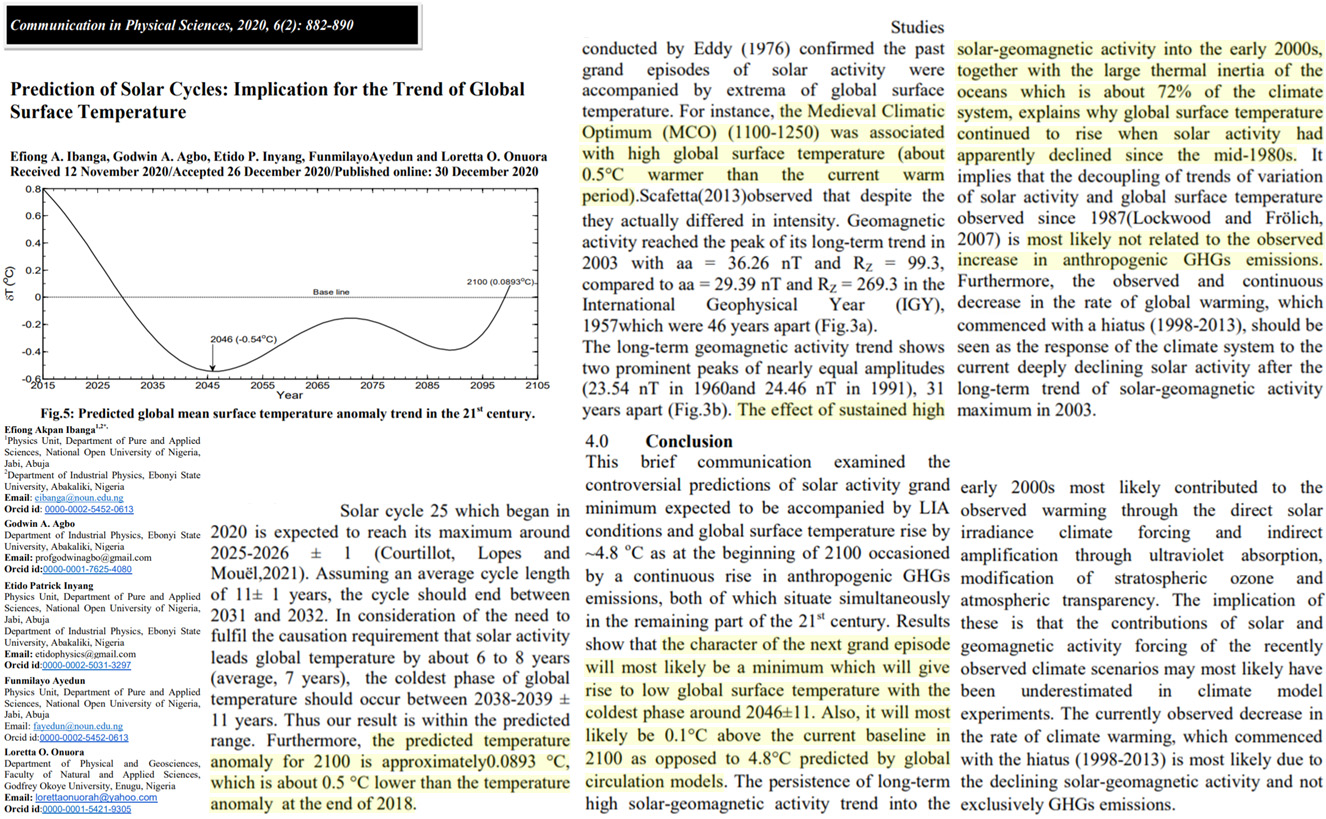By Kenneth Richard on 7. February 2022
Scientists: Due to the decline in solar geomagnetic activity the Earth is poised to endure a cooling period over the coming decades, with the coldest temperatures arriving by 2038 or 2039 ±11 years.
Human greenhouse gas emissions are not likely the cause of recent temperature changes; geomagnetic activity is. Nor will greenhouse gases reverse the effects of the predicted cooling.
The cooling will amount to about 1.3°C lower temperatures in the next few decades, then gradually increasing temperatures to 2100, when it will be 0.5°C colder than 2018.
To boot, the authors point out that the Medieval Warm Period had 0.5°C warmer global-scale temperatures than today.

Ibanga et al., 2021
“For instance, the Medieval Climatic Optimum (MCO) (1100-1250) was with high global surface temperature (about 0.5°C warmer than the current warm period).”
“The effect of sustained high solar-geomagnetic activity into the early 2000s, together with the large thermal inertia of the oceans which is about 72% of the climate system, explains why global surface temperature continued to rise when solar activity had apparently declined since the mid-1980s. It implies that the decoupling of trends of variation of solar activity and global surface temperature observed since 1987 (Lockwood and Frölich, 2007) is most likely not related to the observed increase in anthropogenic GHGs emissions. Furthermore, the observed and continuous decrease in the rate of global warming, which commenced with a hiatus (1998-2013), should be seen as the response of the climate system to current deeply declining solar activity after the long-term trend of solar-geomagnetic activity maximum in 2003.”
“Solar cycle 25 which began in 2020 is expected to reach its maximum around 2025-2026 ± 1 (Courtillot, Lopes and Mouël,2021). Assuming an average cycle length of 11± 1 years, the cycle should end between 2031 and 2032. In consideration of the need to fulfil the causation requirement that solar activity leads global temperature by about 6 to 8 years (average, 7 years), the coldest phase of global temperature should occur between 2038-2039 ±11 years. Thus our result is within the predicted range. Furthermore, the predicted temperature anomaly for 2100 is approximately 0.0893 °C, which is about 0.5 °C lower than the temperature anomaly at the end of 2018.”
Posted in CO2 and GHG, Cooling/Temperature, Solar Sciences |






[…] 5 Nigerian Physicists Predict Global Cooling In The Next 80 Years: 2100 Will Be 0.5°C Colder Than 2… […]
” between 2038-2039 ±11 years. ”
2038 – 11 = 2027
2038 + 11 = 2049
If I do not encounter a personal Black Swan event I will check in 2027 to see if 0.0893 °C is happening. By 2049, someone else will have to check.
Anyway, temperatures specified to 4 places after the decimal is a bit of a stretch for me. I have two outside temperature sensors and they only use one decimal place and hardly ever agree on that.
That said, I don’t disagree with the general theme of the report.
I have said before- luv your work- however, these Nigerian Physicists aren’t ‘princes’ also? You have to admit it does sound funny.
The solar wind weakened from 1995, driving a warmer AMO. The 1970’s had the strongest solar wind states of the space age, driving a colder AMO. The next coming coldest AMO anomaly around 2046 is good, but they have the logic of why backwards. It will take a return of stronger solar wind states to do that, not a grand solar minimum.
There has only been one year of significant warming this century which began late 2015 and finished in 2016. No significant warming since 2016. The warming is caused by ENSO. Go through all the global temperature data sets for yourself, the warming has always been ENSO.
During la nina and el nino, changes in wind and cloud cover increase the amount of short wave radiation (sunlight) which warms the Pacific ocean and warms the planet. The warming only occurs during very strong el ninos.
How does CO2 cause ENSO to warm the planet?
How is changes in the sun causing ENSO to warm the planet.
There is no guarantee that we will have another very strong el nino any time soon.
There has never been a correct long term climate prediction. The primary problem with modern climate science is too many always wrong wild guess climate predictions. Now we have another one. Oh Boy !
I’m looking for a mirror image decrease of the temperature increase in the twentieth century. I doubt if we’ll see the 1.34 deg C decrease by 2045, though.
More than likely that there will be NO ONE HERE by 2100, so it doesn’t matter.
@ Fred F. Mueller:
Thanks, Fred. It certainly seems plausible that, after the Earth had reached a fair size, the collisions would have been quite violent and released a lot of energy into the planet, but that seems to be after the planet has already started.
Mind you, I’ve never seen a planet start, so I don’t know what it is like.
I’m still hunting for fossilised crisp packets.
[…] 5 Nigerian Physicists Predict Global Cooling In The Next 80 Years: 2100 Will Be 0.5°C Colder Than 2… […]